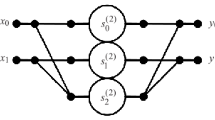Abstract
Discrete cosine transforms (DCT) are essential tools in numerical analysis and digital signal processing. Processors in digital signal processing often use fixed point arithmetic. In this paper, we consider the numerical stability of fast DCT algorithms in fixed point arithmetic. The fast DCT algorithms are based on known factorizations of the corresponding cosine matrices into products of sparse, orthogonal matrices of simple structure. These algorithms are completely recursive, are easy to implement and use only permutations, scaling, butterfly operations, and plane rotations/rotation-reflections. In comparison with other fast DCT algorithms, these algorithms have low arithmetic costs. Using von Neumann–Goldstine’s model of fixed point arithmetic, we present a detailed roundoff error analysis for fast DCT algorithms in fixed point arithmetic. Numerical tests demonstrate the performance of our results.
Similar content being viewed by others
References
Acharya, T., Tsai, P.-S.: JPEG2000 Standard for Image Compression. Wiley, New Jersey (2005)
Ansari, R., Memon, N.: The JPEG lossy image compression standard. Handbook of Image and Video Processing, pp. 513–526. Academic, New York (2000)
Higham, N.J.: Accuracy and Stability of Numerical Algorithms, 2nd edn. SIAM, Philadelphia (2002)
Knight, W.R., Kaiser, R.: A simple fixed-point error bound for the fast Fourier transform. IEEE Trans. Acoust. Speech Signal Process. 27, 615–620 (1979)
Meyer-Bäse, U.: Schnelle Digitale Signalverarbeitung, pp. 95–96. Springer, Berlin (2000)
von Neumann, J., Goldstine, H.H.: Numerical inverting of matrices of high order. Bull. Amer. Math. Soc. 53, 1021–1099 (1947)
Plonka, G., Tasche, M.: Fast and numerically stable algorithms for discrete cosine transforms. Linear Algebra Appl. 394, 309–345 (2005)
Primbs, M.: Worst-case error analysis of lifting-based fast DCT-algorithms. IEEE Trans. Signal Process. 53, 3211–3218 (2005)
Rao, K.R., Yip, P.: Discrete Cosine Transform: Algorithms, Advantages, Applications. Academic, Boston (1990)
Schreiber, U.: Fast and numerically stable trigonometric transforms (in German). Thesis, Univ. of Rostock (1999)
Tasche, M., Zeuner, H.: Roundoff error analysis for fast trigonometric transforms. In: Anastassiou, G (ed.) Handbook of Analytic-Computational Methods in Applied Mathematics. Chapman & Hall (2000)
Vaidyanathan, P.P.: Multirate Systems and Filterbanks. Prentice Hall, Englewood Cliffs, NJ (1993)
Van Loan, C.F.: Computational Framework for the Fast Fourier Transform. SIAM, Philadelphia (1992)
Wang, Z.: Fast algorithms for the discrete W transform and the discrete Fourier transform. IEEE Trans. Acoust. Speech Signal Process. 32, 803–816 (1984)
Wilkinson, J.H.: Rounding Errors in Algebraic Processes. Prentice Hall, London (1963)
Author information
Authors and Affiliations
Corresponding author
Rights and permissions
About this article
Cite this article
Ihsberner, K. Roundoff error analysis of fast DCT algorithms in fixed point arithmetic. Numer Algor 46, 1–22 (2007). https://doi.org/10.1007/s11075-007-9123-1
Received:
Accepted:
Published:
Issue Date:
DOI: https://doi.org/10.1007/s11075-007-9123-1
Keywords
- Discrete cosine transform
- Fast cosine transform
- Numerical stability
- Factorization of cosine matrix
- Roundoff error
- Fixed point arithmetic




